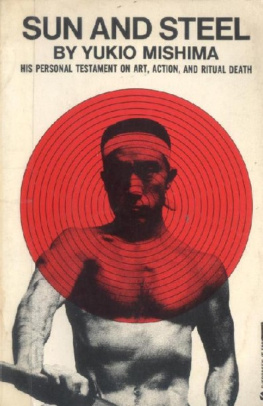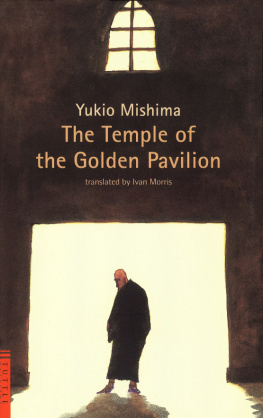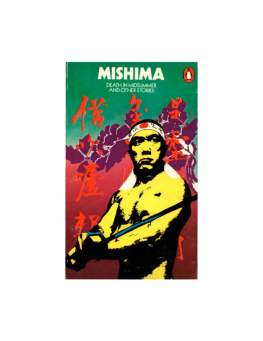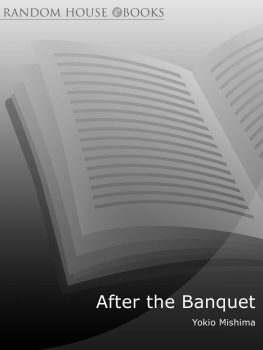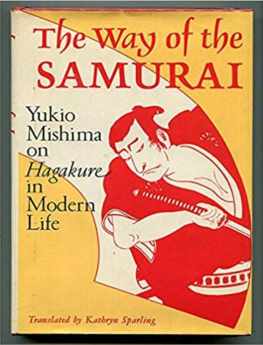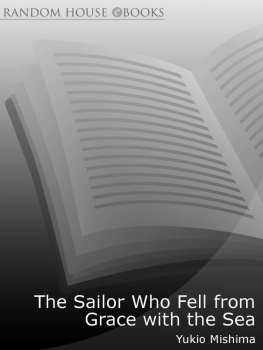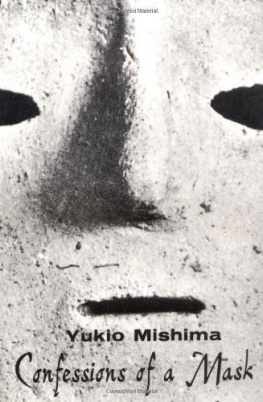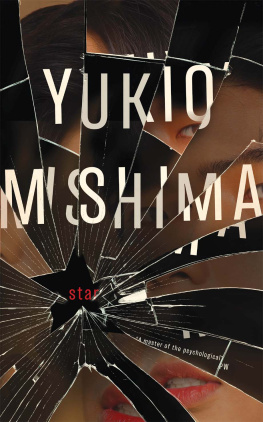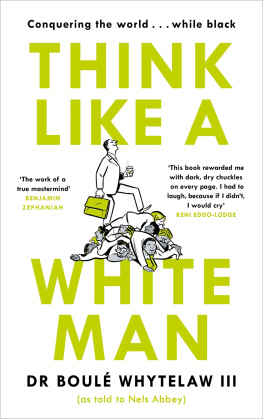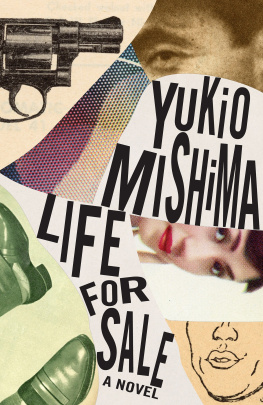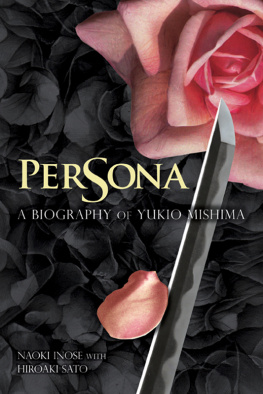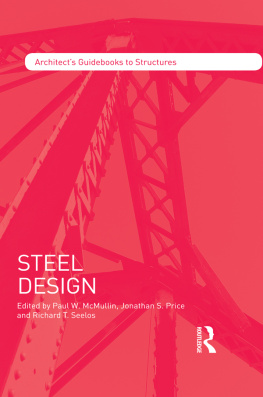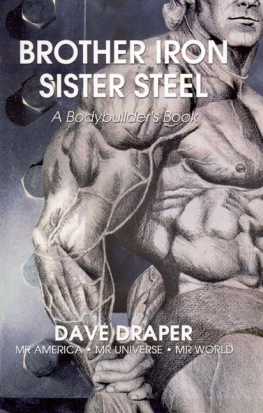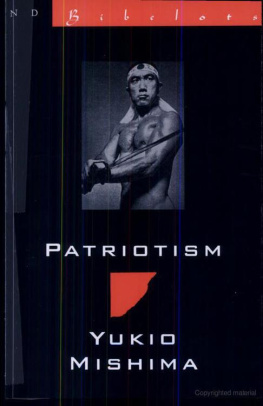SUN AND STEEL
BY YUKIO MISHIMA
HIS PERSONAL TESTAMENT ON ART. ACTION, AND RITUAL DEATH
1
Of late, I have come to sense within myself an accumulation of all kinds of things that cannot find adequate expression via an objective artistic form such as the novel. A lyric poet of twenty might manage it, but I am twenty no longer, and have never been a poet at any rate. I have groped around, therefore, for some other form more suited to such personal utterances and have come up with a kind of hybrid between confession and criticism, a subtly equivocal mode that one might call confidential criticism."
I see it as a twilight genre between the night of confession and the daylight of criticism. The I with which I shall occupy myself will not be the I that relates back strictly to myself, but something else, some residue, that remains after all the other words I have uttered have flowed back into me, something that neither relates back nor flows back.
As I pondered the nature of that I, I was driven to the conclusion that the I in question corresponded precisely with the physical space that I occupied. What I was seeking, in short, was a language of the body. If my self was my dwelling, then my body resembled an orchard that surrounded it. I could either cultivate that orchard to its capacity or leave it for the weeds to run riot in. I was free to choose, but the freedom was not as obvious as it might seem. Many people, indeed, go so far as to refer to the orchards of their dwellings as destiny.
One day, it occurred to me to set about cultivating my orchard for all I was worth. For my purpose, I used sun and steel. Unceasing sunlight and implements fashioned of steel became the chief elements in my husbandry. Little by little, the orchard began to bear fruit, and thoughts of the body came to occupy a large part of my consciousness.
All this did not occur, of course, overnight. Nor did it begin without the existence of some deep-lying motive.
When I examine closely my early childhood, I realise that my memory of words reaches back far farther than my memory of the flesh. In the average person, I imagine, the body precedes language. In my case, words came first of all; thenbelatedly, with every appearance of extreme reluctance, and already clothed in conceptscame the flesh. It was already, as goes without saying, sadly wasted by words.
First comes the pillar of plain wood, then the white ants that feed on it. But for me, the white ants were there from the start, and the pillar of plain wood emerged tardily, already half eaten away.
Let the reader not chide me for comparing my own trade to the white ant. In its essence, any art that relies on words makes use of their ability to eat awayof their corrosive functionjust as etching depends on the corrosive power of nitric acid. Yet the simile is not accurate enough; for the copper and the nitric acid used in etching are on a par with each other, both being extracted from nature, while the relation of words to reality is not that of the acid to the plate. Words are a medium that reduces reality to abstraction for transmission to our reason, and in their power to corrode reality inevitably lurks the danger that the words themselves will be corroded too. It might be more appropriate, in fact, to liken their action to that of excess stomach fluids that digest and gradually eat away the stomach itself.
Many people will express disbelief that such a process could already be at work in a persons earliest years. But that, beyond doubt, is what happened to me personally, thereby laying the ground for two contradictory tendencies within myself. One was the determination to press ahead loyally with the corrosive function of words, and to make that my lifes work. The other was the desire to encounter reality in some field where words should play no part at all.
In a more healthy process of development, the two tendencies can often work together without conflict, even in the case of a born writer, giving rise to a highly desirable state of affairs in which a training in words leads to a fresh discovery of reality. But the emphasis here is on rediscovery; if this is to happen, it is necessary, at the outset of life, to have possessed, the reality of the flesh still unsullied by words. And that is quite different from what happened to me.
My composition teacher would often show his displeasure with my work, which was innocent of any words that might be taken as corresponding to reality. It seems that, in my childish way,
I had an unconscious presentiment of the subtle, fastidious laws of words, and was aware of the necessity of avoiding as far as possible coming into contact with reality via words if one was to profit from their positive corrosive function and escape their negative aspectif, to put it more simply, one was to maintain the purity of words. I knew instinctively that the only possibility was to maintain a constant watch on the corrosive action lest it suddenly come up against some object that it might corrode.
The natural corollary of such a tendency was that I should openly admit the existence of reality and the body only in fields where words had no part whatsoever; thus reality and the body became synonymous for me, the objects, almost, of a kind of fetishism. Without doubt, too, I was quite unconsciously expanding my interest in words to embrace this interest also; and this type of fetishism corresponded exactly to my fetish for words.
In the first stage, I was quite obviously identifying myself with words and setting reality, the flesh, and action on the other side. There is no doubt, either, that my prejudice concerning words was encouraged by this willfully created antinomy, and that my deep-rooted misunderstanding of the nature of reality, the flesh, and action was formed in the same way.
This antinomy rested on the assumption that I myself from the outset was devoid of the flesh, of reality, of action. It was true, indeed, that the flesh came late to me at the beginning, but I was waiting for it with words.
I suspect that because of the earlier tendency I spoke of, I did not perceive it, then, as my body. If I had done so, my words would have lost their purity. I should have been violated by reality, and reality would have become inescapable.
Interestingly enough, my stubborn refusal to perceive the body was itself due to a beautiful misconception in my idea of what the body was. I did not know that a mans body never shows itself as existence. But as I saw things, it ought to have made itself apparent, clearly and unequivocally, as existence. It naturally followed that when it did show itself unmistakably as a terrifying paradox of existenceas a form of existence that rejected existenceI was as panic-stricken as though I had come across some monster, and loathed it accordingly. It never occurred to me that other menall men without exceptionwere the same.
It is perhaps only natural that this type of panic and fear, though so obviously the product of a misconception, should postulate another more desirable physical existence, another more desirable reality. Never dreaming that the body existing in a form that rejected existence was universal in the male, I set about constructing my ideal hypothetical physical existence by investing it with all the opposite characteristics. And since my own, abnormal bodily existence was doubtless a product of the intellectual corrosion of words, the ideal bodythe ideal existencemust, I told myself, be absolutely free from any interference by words. Its characteristics could be summed up as taciturnity and beauty of form.
At the same time, I decided that if the corrosive power of words had any creative function, it must find its model in the formal beauty of this ideal body, and that the ideal in the verbal arts must lie solely in the imitation of such physical beautyin other words, the pursuit of a beauty that was absolutely free from corrosion.

